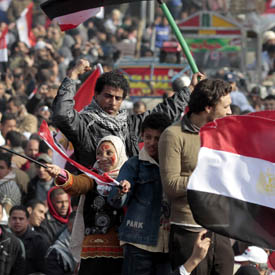Egypt demonstrations as new inquiry is launched
Crowds fill Cairo’s streets to mark a year since the movement to oust President Hosni Mubarak began. Meanwhile, Egyptian MPs have launched an inquiry into the violent suppression of demonstrations.

Demonstrators in Cairo’s iconic Tahrir Square – which became known throughout the world as the centre of the uprising – called for Field Marshal Mohamed Hussein Tantawi, Egypt’s de facto ruler, to be executed, chanting: “Down, down with military rule!”
In other areas, youths shouted “Revolution until victory! Revolution in all of Egypt’s streets!” in chants indicative of the mood shared by many, that the revolution is not over until the military cedes power.
Some say the protests should now end and that time should be given for Egypt to implement reform. “The council will leave power in any case. Sure, the revolution is incomplete, but it doesn’t mean we should obstruct life,” Mohamed Othman, one of those demonstrating in Tahrir square today, told the Reuters news agency.
But others accuse the ruling generals of attempting to “hijack” the revolution, claiming they were behind the unseating of Mubarak.
Cautious welcome
The protests came a day after the speaker of the Egyptian parliament, Saad el-Katatni, announced that ministers would launch a new inquiry into the violence last January, during which an estimated 846 were killed.
The demand for justice for the perpetrators of the violence had been a rallying cry for protesters before today’s anniversary demonstrations.
Parliament’s initiative is important and is in response to public anger for the failure to investigate demonstrations. Heba Morayef, Human Rights Watch
Human rights activists cautiously welcomed news of the inquiry, saying that further details – including the inquiry’s power to call military officials as witnesses or suspects – needed to be established.
Speaking from Cairo, Heba Morayef, Egypt researcher with Human Rights Watch, told Channel 4 News: “The parliament’s initiative is important and it is in response to public anger and disquiet for the failure to investigate demonstrations which resulted in the death of protesters. It will be welcome.
“But the biggest question is what the mandate of the inquiry will be. On various occassions, the minister of justice has set up a committee with prosecutors and judges to investigate the violence, and frequently, they have not produced reports or not had the capacity to summon military officers.”
‘I did not commit a crime’
In an apparent gesture to the reform movement, the military council said on Tuesday it would lift a state of emergency in place since 1981. However, the move caused public disappointment after the council left in place a clause which meant its laws would still apply in some cases of “thuggery”, prompting fears that arbitrary arrests will continue.
Meanwhile, on Tuesday night Maikel Nabil Sanad, described as the first political prisoner of conscience since January 25, released a powerful video address (see below) immediately after he was freed from 302 days’ detention at the hands of Egypt’s Supreme Council of the Armed Forces.
In the video, he “categorically” refutes the decision by Field Marshal Tantawi to “absolve” him, and he rejects the word “pardon” because “I did not commit a crime… I was practising my right to express my opinion freely, to adopt a certain belief and to promote my thoughts.”